 Anyone who studies counselling is likely to come across Carl Rogers and his three core conditions, namely congruence (being real, genuine), empathy (understanding) and what he calls "unconditional positive regard". The counsellor must treat the client with unconditional positive regard. I think it could be argued that a simpler word for unconditional positive regard is "love". The counsellor must treat the client with love.
Anyone who studies counselling is likely to come across Carl Rogers and his three core conditions, namely congruence (being real, genuine), empathy (understanding) and what he calls "unconditional positive regard". The counsellor must treat the client with unconditional positive regard. I think it could be argued that a simpler word for unconditional positive regard is "love". The counsellor must treat the client with love.I have often reflected in the 32 months I've been a prison chaplain that much of what is contained in the two A4 pages of job description I was given could be summarised in an instruction to "love" the prisoners. Of course, the Scottish Prison Service, my employers, do not tend to use such language and nor would anyone expect them to. But I do see my role in the prison, at least in part, as being to love the prisoners.
I've had two interesting conversations recently which have awakened me to the fact that this is quite likely to be misunderstood by non chaplains.
A number of weeks ago, a prison officer asked me whether I got fed up sometimes with some of the prisoners who were unlikely to change and who had unpleasant attitudes and behaviours. He had noticed that I had been willingly giving a lot of time to one particular young man who, it was generally felt, was likely to be a lifelong habitual offender due to his background as a child and his pattern of offending thus far, along with his attitude to authority. As we talked it dawned on me that this officer thought that I was blind to the prisoner's faults and that I was naive to be giving him the time of day. It was great that we had that conversation as I was able to explain that we do not, as chaplains, divide prisoners in our minds into two groups - the bad guys and the good guys. On principle we treat them all as if they were "good guys", not because we are blind to their faults (far from it - some of their offences and attitudes are extremely offensive) but because we intentionally choose to treat them that way. As a Christian, I believe that I am to love everyone. I believe that everyone is made in the image of God and although that bit of them can be suppressed and repressed very thoroughly, it is my job to look and look for that bit and draw it out and encourage it.
The other conversation I had was similar in a way. I was contacted by email by a lady who writes for a German business magazine. They have a regular piece where they compare and contrast two people doing the same job in different parts of the world. For some reason they had decided to have an article on prison chaplains (not sure why, in a business magazine!) and had randomly picked myself in Scotland and a chaplain of a maximum security prison in Jamaica. We had a fascinating three way phone conversation. At some point in that conversation I said, as above, that I thought my job was to love the prisoners. A week later, I was emailed with some questions of clarification, including the question of whether it was always possible to love prisoners who had done bad things or had bad attitudes. My response was that love is not a feeling but an act of the will. Loving prisoners is not based on how lovable they are but on my intention, with God's help, to love them.
If prison chaplains were blind to the faults of the people they meet, or if they believed everything they heard (we certainly don't!) then, yes, naive would be the word. If prison chaplains choose, as an act of the will, to love those they work with and to look for the vestiges of the image of God in them in order to draw that out, then this is not naivete.
(Note: Non-Christian readers, unimpressed with talk about being made in the image of God, may relate better to the idea of how we treat people affecting how they behave. If I treat a man as a useless good-for-nothing, that may become a self-fulfilling prophecy. If I treat him instead as someone with the potential for change, with the potential to do good for his family and community, then this may result in his behaving better.)











6 comments:
Guess it's down to their definition of love. Take's a bit of getting used to "unconditional love" when all you have faced is negativity and a misaligned perception of the meaning of love. Break that barrier things happen in a positive sense.
I enjoyed looking over your blog
God bless you
You're right, A-D. It's a case of; Give a dog a bad name and he may as well live up to it, so to speak.
I think the idea of treating people with respect and not assuming the worst about about can and does have positive outcomes (whether you categorise it as 'love' as a religious duty, or any other way)
In a smaller way, i had a similar experience with some children/teens in my area.
When I moved into my house is on a mixed (some social housing,some owner occupied) estate which has few amenities, I was told by a neighbour that the previous occupants had had a lot of trouble with kids making a nuisnace of themselves - my house (uniquely in the street) has a low 'platform' outside so the kid who are hanging about tend to congregate there to sit on the wall.
I have never had any trouble at all. If I happen to go out, I usually say hello. If they aer making a lot of noise I will ask them nicely to be quieter. In return, they will often ask me if Imind them being there, if they see me coming in, they carefully crush their cans and put them into my recycling box (one day I am going to exoplain to the bin-men than no, I don't have a white-lightening & carling habit) and if they see me coming out with a bag full of rubbish they will take it and put it in my bin.
I was puzzled as to why my predecessors should have had so much trouble, as it seemed unlikely that the children's own behaviour would have changed so dramatically..... until I found out that they used to put neat bleach on the top of the wall to try to stop the kids ditting there, and would shout abuse at them not only if they sat on the wall, but also when they saw them in the street.
It's one of the most concrete example I have experienced of people responding positively to being treated with courtesy and respect, rateh than on the basis of a preconception of how they will behave.
As an agnostic, I don't see it as 'love' in the sense you have escribed, more as a basic courtesy of treating people with the respect I would want to be treated with myself.
Thanks all. That's such a wonderful story, Marjorie. Thanks for sharing it.
Thanks all. That's such a wonderful story, Marjorie. Thanks for sharing it.
Post a Comment